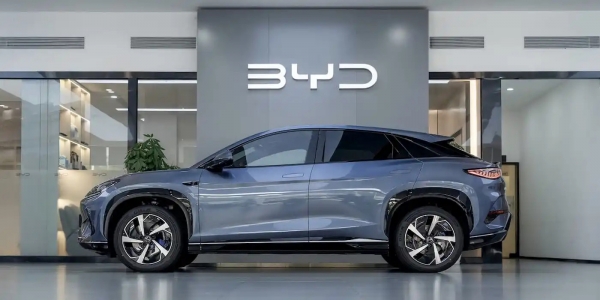BYD's overwhelming No. 1 Tesla Down 3! Global EVs grow 34% in January-May
|
According to a report published by the Korea Automobile Mobility Industry Association (KAMA) on the 7th, the electric vehicle market grew 33.6% year-on-year with about 7.73 million units sold. Sales of pure electric vehicles rose 34.5% year-on-year to 5.02 million units, accounting for 13.7% of the total new car market.
BYD midsize SUV C-rayon 7
Sales have increased in most regions except Japan. High growth, especially in Europe and China, drove global sales. In Korea and Europe, the expansion of new entry-level electric vehicle models contributed to the increase in sales, while in China, policies to boost domestic demand and intensifying price competition contributed to the increase in sales.
PHEV (plug-in hybrid vehicles) also sold 2.72 million units, up 31.9% from the previous year, expanding the share of the total new car market to 7.4%. PHEV's growth was driven by lower prices and stability of mileage compared to BEV, expansion of new models by Chinese companies, and expansion of PHEV exports to avoid high tariffs on Chinese electric vehicles by the EU.
The growth of the global electric power vehicle market was largely influenced by China and Europe, the largest markets, which was mainly supported by governments and increased incentives from manufacturers. As the world's largest market for electric vehicles, China sold 5.22 million units, up 41.1% year-on-year, accounting for 40.1% of the total market.
a geo-electric car
The main growth factors were the government's extension of incentives such as new energy vehicle purchase tax reduction benefits and policies to support replace old cars, the expansion of production of local brands such as BYD, NIO, and Xpeng, and the fall in electric vehicle prices due to intensifying price competition.
The European EV market grew 24.2% year-on-year to approximately 1.43 million units. Sales volume by country varied according to incentive policies, but it showed double-digit growth in most countries due to the expansion of entry-level BEV releases to comply with CO2 standards in 2025.
The U.S. sold about 600,000 units, up 5.7% year-on-year, accounting for 8.2% of the global market share. It was analyzed that the advance demand was caused by concerns about the manufacturer's expansion of the launch of new models, the sunset of IRA tax benefits, and the increase in vehicle prices due to the imposition of tariffs on automobiles.
On the other hand, the Japanese electric vehicle market declined for the second consecutive year to about 40,000 units, down 10.3% from the previous year. Despite the increase in electric vehicle subsidies, the decline is due to a combination of the complex subsidy system, a decrease in sales of Nissan light electric vehicles, a lack of new models from Japanese brands, delays in building charging infrastructure, and strong hybrid demand.
If you look at sales by company, the growth of Chinese companies, including BYD, was noticeable due to the expansion of shipments by Chinese companies due to the Chinese government's continued domestic revitalization and export support policies. BYD remained No. 1 with 1.96 million units, a 44.8% year-on-year increase through China's domestic demand-boosting policy, production expansion, aggressive price cuts, and expansion into Europe and emerging economies.
Gely Group, which owns Volvo, Polestar and Zicker, ranked second, beating Tesla, up 81.8% year-over-year on the back of solid performance across its portfolio.
In the global electric vehicle market, sales of existing non-Chinese companies, excluding Tesla and Stellantis, increased.Tesla fell to third place at 631,000 units, down 19.0% year-on-year, due to simultaneous sales in China, the U.S., and Europe due to intensifying competition in China, delays in the launch of the new Model Y, and antipathy against Elon Musk's political moves.
Stellantis fell 10.3% year-on-year due to disruptions in the supply and demand of PHEV core components and a decrease in PHEV sales in North America. Volkswagen (VW) expanded its new model to respond to the European market and resumed incentives in Germany, while GM's sales of new BEVs and new models adopting Ultium PF in the U.S. were effective.
N2MT07||text parameter is needed (text 파라미터가 필요합니다.)
Hyundai-Kia sold 22.5 million units, up 17.0 percent year-on-year, on the back of U.S. production and expansion of new models such as EV3, EV4, Ioniq9 and Casper Electric.
Editor Kim Tae-jin, tj.kim@carguy.kr
Top 10 sales of global electric vehicles (BEV+PHEV+FCEV) between January and May 2025 (unit: large, %)
* Data: Marklines Co., Ltd. ( ) is "Sales ranking from January to May 24, and GM sales include Chinese SAIC-GM-Wooling."
This article was translated by Naver AI translator.




